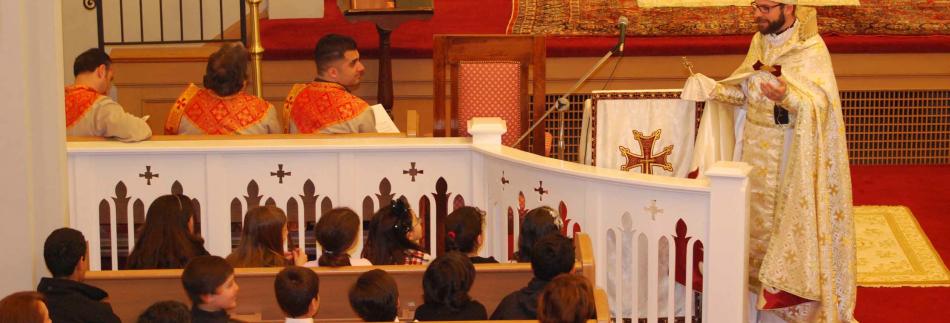
Join us every Sunday morning to celebrate the Divine Liturgy. The Divine liturgy is the main worship service of the Armenian Church. But the Badarak is much more than that. It provides the most intimate encouter we can have with God in this life. In the Divine Liturgy, Jesus Christ, the Son of God, comes to his people - to you and me - in two forms: First, by his Word, in the reading of the holy Gospel; and second, by his holy Body and Blood, in Holy Communion. These two actions -- the reading of the Word of God, and the reception of Holy Communion -- are the two pillars or building blocks of the Divine Liturgy in all ancient, apostolic churches.
Learn more about the Divine Liturgy in our Online Walk Through of the Divine Liturgy.
What: Divine Liturgy (Soorp Badarak)
When: 10:30 a.m. every Sunday
Where: St. John Armenian Apostolic Church
The Divine Liturgy (Badarak) of the Armenian Church
The principal liturgical service of the Armenian Church is the Divine Liturgy (Badarak).
The Badarak is not merely one of the things the Church does. It is the most important expression of the Church's faith and identity.
The Divine Liturgy of the Armenian Apostolic Church has four parts: the Preparation, the Synaxis, the Holy Sacrifice, and the Last Blessing and Dismissal.
In the Divine Liturgy there is a communal action taking place that other "gatherings" cannot offer us. As active, participating members of the body of Christ, we are united to each other and to Christ in the Divine Liturgy. The Greek word for worship, Leiturgia, means "corporate action," in which everybody takes an active part.
In the gathering of the Divine Liturgy we find the core and culmination of all that occurs in the life of the Church. In this sacrament, we participate in the sacrifice of our Lord Jesus Christ, and communicate with His body and blood, which unites us to Him. Christ is present in the Divine Liturgy and we are truly united as one body to Him.
The Divine Liturgy is the manifestation of the Kingdom of God on earth. That is, the Kingdom of God becomes present and active among us when we gather in the Church for the Divine Liturgy. Our entrance into this experience is said to be a journey — a journey from where we are in our daily lives to somewhere different and special.
The journey begins as soon as we leave our lives in the present world — to go to Church. Already a sacramental act is taking place, for we are on our way to be transformed into the Church of God. What we experience in the Divine Liturgy is unlike any thing in our world. For it is in the Divine Liturgy that we are able to participate in the "new life" of the Kingdom of God, which is present amongst us. The atmosphere itself is different from what we experience most of the time. It is an atmosphere which directs our attention away from our earthly life toward the heavenly life. In the Church, the air smells sweet with incense; there are candles aglow all around us; our ears are filled with singing; the priest wears beautiful vestments; the altar is richly adorned with sacred vessels; and all who are gathered sense something unique about this gathering.
The Divine Liturgy is also a time for instruction. We hear the reading of the Holy Scriptures, which is the Divine Word of God, written and spoken to us. We are taught how to understand what we hear through the preaching by the priest. We receive instruction and edification from the hymns that are sung, because in the hymns are expressed the teachings and faith of the Armenian Church. We are instructed in the liturgy, because as the People of God, we are called to grow in faith and knowledge.
For the church congregation, the liturgy is also a time for celebration of the living Christ who is present with us and of our love and joy as we sense our unity with Christ and with one another. It is precisely for this reason that there is no such thing as a "private" Liturgy. Each and every Liturgy is celebrated for the whole congregation, for all and on behalf of all.
The Eucharist is the focal point of the Divine Liturgy. By it, we offer ourselves to God, and Christ offers Himself to us. It is the means by which we are united with Christ and with each other. This union is not limited to just those who are present in one particular Church Building. It is a union of all who are members of the Church, "the living, the dead, the saints and the angels." The Eucharist nourishes and sustains us, and gives us life as individuals and as members of the congregation. God gave us the world as food, and has given us food as a means of communion with Him.
Both the priest and the Laity are necessary for the celebration of the Divine Liturgy. The congregation assembles to offer the sacrifice and to receive Christ into their lives. The priest offers the sacrifice with and for the congregation and makes Christ's presence known to us. As we receive from the same cup, we are truly united to each other as one family. Having had this experience, we are able to return to the world strengthened to live as Christians. All that we receive from participating in the Divine Liturgy nourishes and sustains us: the Instruction, the Fellowship, the Love, and the continuing Life in Christ.
— Written by Fr. Mardiros Chevian and published here courtesy of the Armenian Heritage Organization